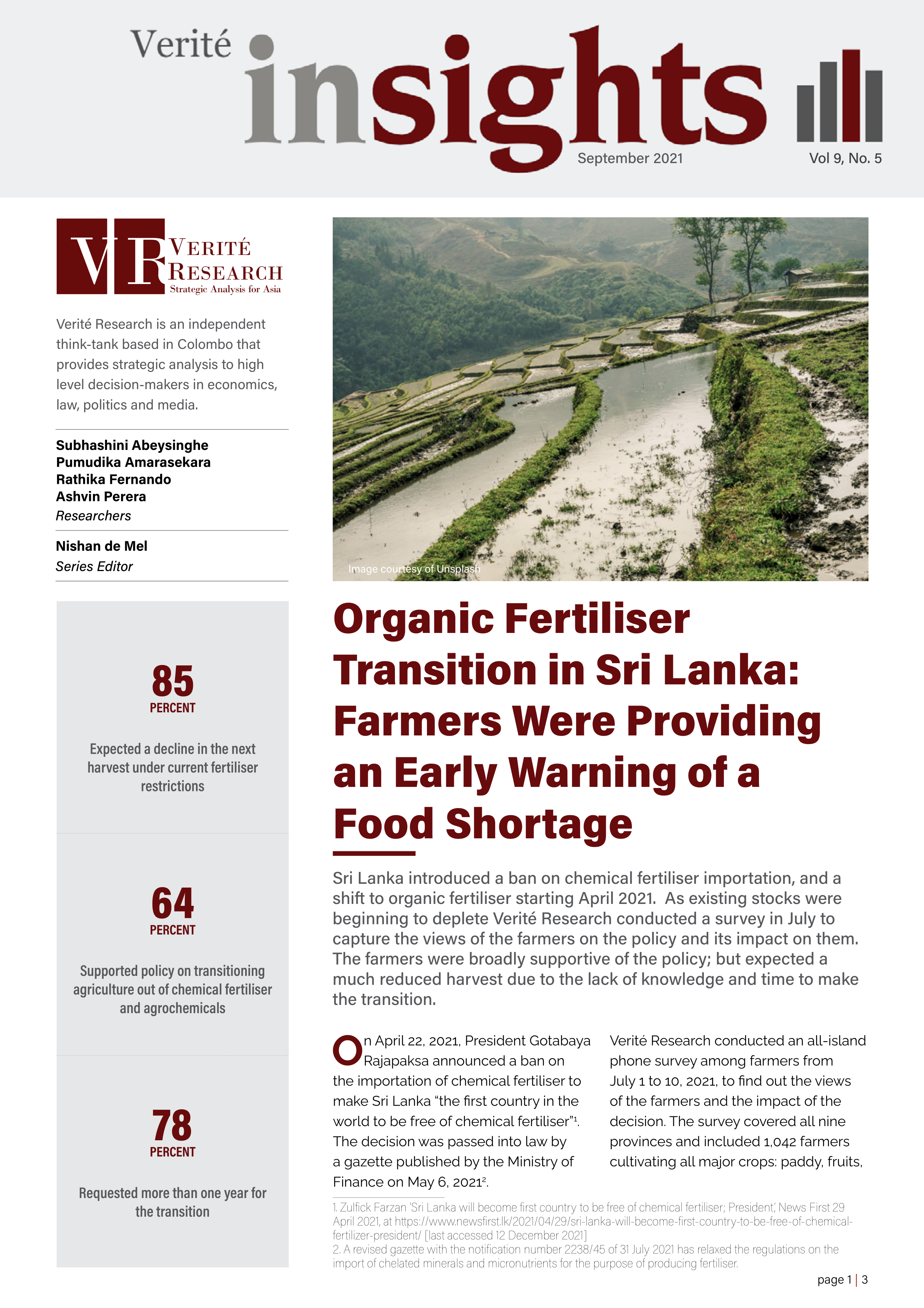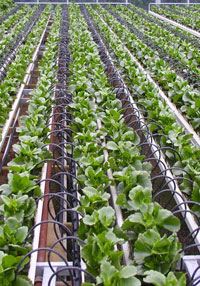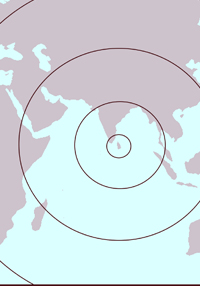ශ්රී ලංකාව 2021 අප්රේල් මස සිට රසායනික පොහොර ආනයනය තහනම් කරමින්, කාබනික පොහොර වෙත මාරු වීමට පියවර ගන්නා ලදී. පවතින රසායනික පොහොර තොග අඩු වෙමින් පවතින වාතාවරණයක් තුල පොහොර ප්රතිපත්තිය පිළිබඳව ගොවීන්ගේ අදහස් සහ එහි බලපෑම අවබෝධකර ගැනීම සඳහා වෙරිටේ පර්යේෂණ ආයතනය ජූලි මාසයේදී සමීක්ෂණයක් පවත්වන ලදී. ගොවීන් මෙම ප්රතිපත්තියට පුළුල් ලෙස සහයෝගය දැක්වූ නමුත් ගොවීන්ගේ අදහස වුයේ මෙම පරිවර්තනය සාර්ථකව කිරීමට අවශ්ය දැනුම හා කාලය නොමැතිකම නිසා බොහෝ අඩු අස්වැන්නක් ලැබෙනු ඇති බවයි.
Sri Lanka introduced a ban on chemical fertiliser importation, and a shift to organic fertiliser starting April 2021. As existing stocks were beginning to deplete Verité Research conducted a survey in July to capture the views of the farmers on the policy and its impact on them. The farmers were broadly supportive of the policy; but expected a much reduced harvest due to the lack of knowledge and time to make the transition.
රජයේ ආදායමට ආනයන බදු නිසා සිදුවන සේවය සුලුපටු නොවේග එසේ වුවත් මෙම බදු සාමාන්යයෙන් ඉහල අගයක් ගන්නා අතර තමන්ට අත්යවශ්ය අමුද්රව්ය සහ යන්ත්ර සුත්රගෙන්වීමේ දී එකිනෙකට වෙනස් ආකාර පහක බදු ගෙවීමට සිදුවීම දේශීය ව්යාපාරිකයන්ගේ පිරිවැය ඉහල යාමට හේතු වේග එසේම ඉහල පිරිවැය දේශීය ව්යාපාරිකයන් :විශේෂයෙන්ම සුළු සහ මධ්යම ව්යාපාරිකයන්* නවතම තාක්ෂණ උපකරණ කරා යොමු වීම වැළැක්වීමට හේතු වේග මෙම ගැටලුවට විසඳුමක් ලෙස රජය විසින් ආනයන බදු සහන යෝජනාවලීන් රැසක් හඳුන්වා දී තිබේග එමගින් බලාපොරත්තු වන්නේ ඉහල තාක්ෂණ උපකරණ සහ අමුද්රව්ය වල පිරිවැය පහල දැමීම තුලින්ල ව්යාපාරිකයාගේ කාර්යක්ෂමතාව සහ ඵලදායිතාව ඉහළ දැමීමයිග එසේ වුවත් මෙම විසඳුම ක්රියාත්මක වී ඇත්තේ බලාපොරොත්තු වන ප්රතිලාභ ලබා ගැනීමට ඇති ඉඩ ප්රස්තා ඇහිරෙන ආකාරයට බව වෙරිටේ ආයතයනය කල පර්යේෂණයකින් හෙළි දරවු වේග තෝරාගත් ආනයන බදු සහන යෝජනා වලීන් කිහිපයකට අදාලවන නියාමන වැඩපිළිවෙල එහි සැබෑ ප්රතිලාබීන්ට පමණක් සහන ලබා දීම සහ බදු සහන අවභාවිතය වැලැක්වීම යන මූලික අරමුණු ඉටු කිරීමට බාදාකාරී වන ආකාරයෙන් ක්රියාත්මක වී තිබෙන බව මෙම පර්යේෂණය අනාවරණය කරයිග එසේම මෙම යෝජනාවලීන් හරහා රට තුලට එන භාණ්ඩ පිළිබඳ ප්රකාශිත දත්ත නොමැති විමල එම යෝජනාවල ප්රතිලාබ මෙන්ම එම යෝජනා අවභාවිතය පිළිබඳ තක්සේරුවක් කිරීමට ඇති විශාල බාධාවක් බව මෙම පර්යේෂණය හෙළි කරයිග
Import taxes are critical for government revenue. However, these taxes are often high and prevent businesses from becoming more efficient – businesses sometimes have to pay up to five different taxes when importing essential materials and products. The government has introduced a solution to this problem – import tax exemption schemes. Through these schemes, businesses can bypass certain taxes and save money. Yet, the solution is not as simple as it seems. The current regulatory framework in place for tax exemptions undermines the objective of such schemes – which is to prevent misuse and restrict benefits to eligible parties. Using agricultural equipment as an example, this policy note outlines how the process in place for approving exemptions is (i) opaque; (ii) discretionary; and (iii) prone to abuse.
There are several causes to the problems facing Sri Lanka’s economy. The problem of bureaucratic inefficiency exemplified by this case study: finding information about trade regulations is a significant barrier to improving the economy in agricultural products. The poor performance in the supply of even basic information indicates the larger challenge of improving the bureaucracy.
“In the context of growing bilateral relations with India, this study by Verité Research takes a look at the current status of Sri Lankan exports to India under the existing India – Sri Lanka Free Trade Agreement (ISFTA). The study identifies Non-Tariff Barriers to be a critical factor in the lackluster performance of exports to India in recent years. The case of food exports serves to highlight how compliance with Indian standards and regulations forms one such significant barrier, due to India’s non-recognition of testing and certification conducted outside its borders. The proposed solution to this problem – a Mutual Recognition Agreement – is one that is easily implementablewhich will help exporters enjoy the full benefits of duty concessions offered by the ISFTA and if done right, will help build confidence in the benefits of further integration.”
“In the context of growing bilateral relations with India, this study by Verité Research takes a look at the current status of Sri Lankan exports to India under the existing India – Sri Lanka Free Trade Agreement (ISFTA). The study identifies Non-Tariff Barriers to be a critical factor in the lackluster performance of exports to India in recent years. The case of food exports serves to highlight how compliance with Indian standards and regulations forms one such significant barrier, due to India’s non-recognition of testing and certification conducted outside its borders. The proposed solution to this problem – a Mutual Recognition Agreement – is one that is easily implementablewhich will help exporters enjoy the full benefits of duty concessions offered by the ISFTA and if done right, will help build confidence in the benefits of further integration.”
Sri Lanka’s International Trade: Performance and Prognosis analyses Sri Lanka’s international trade with special reference to its trade deficit, apparel sector and tea exports. It also analyses and evaluates the policies and structural issues Sri Lanka’s trade faces.






